clarinet
All scores that include a part for at least one clarinet.
Mendelssohn - Concert Piece No.1 - Two Winds and Piano
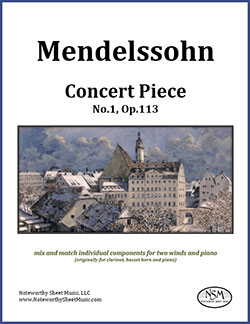 Concert Piece No.1, Op.113, by Felix Mendelssohn
Concert Piece No.1, Op.113, by Felix Mendelssohn
Transcribed for Various Wind Instruments and Piano by John W. Pratt
(originally for Clarinet, Basset Horn, and Piano)
Individual Secondo parts for Bassoon, Clarinet, or English Horn, PDFs $6.99 each
Piano Score, with original Clarinet and Basset Horn lines in concert pitch, PDF $6.99
The following is excerpted from John Pratt's © foreword:
"In 1833, Felix Mendelssohn (1809-1847) wrote two Concert Pieces for Clarinet, Basset Horn, and Piano, op. 113 and op. 114, as show-pieces for the famous clarinetist Heinrich Bärmann (1784-1847) to play with his up-and-coming son Karl (1811-1885) on the basset horn. // Mendelssohn's two Concert Pieces are very suitable for transcription, even aside from the rarity of the basset horn today. We provide, as well as the original clarinet part, transcriptions of it for flute and oboe. Transcriptions of the basset horn part are provided for bassoon, clarinet, and English horn. These primo and secondo parts can be mixed and matched at will. For the score, we use Mendelssohn's instruments rather than some other arbitrary pair. This enables anyone interested to check any transcribed part against the original. The score gives the parts in concert pitch, because a transposition would apply to only one of the possible winds, and because the pianist can then easily play any part at original pitch."
Please note that PDFs of the original score and clarinet-primo part are available free of charge in the public domain (see the listing of this work on IMSLP.org), and our transcribed primo and secondo wind parts can readily be used with the original score. Therefore, you should purchase our original instrument Score or Clarinet-primo part only if you would like measure numbers or Mr. Pratt's score (for piano with clarinet and basset horn) in concert pitch.
- Piano Score with Clarinet and Basset Horn lines in concert pitch, 8 pages; Total, 10 pages (note that the original score is freely available on IMSLP.org)
- Clarinet in B-flat, primo part, 4 pages; Total, 6 pages (note that the original clarinet part is freely available on IMSLP.org)
- Flute, transcribed primo part, 4 pages; Total, 6 pages
- Oboe, transcribed primo part, 4 pages; Total, 6 pages
- Bassoon, transcribed secondo part, 4 pages; Total, 6 pages
- Clarinet in B-flat, transcribed secondo part, 4 pages; Total, 6 pages
- English Horn, transcribed secondo part, 4 pages; Total, 6 pages
Mendelssohn - Concert Piece No.2 - Two Winds (and Piano)
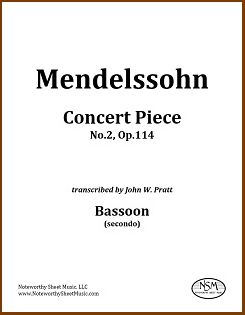 Concert Piece No.2, Op.114, by Felix Mendelssohn
Concert Piece No.2, Op.114, by Felix Mendelssohn
Transcribed for Various Wind Instruments (and piano) by John W. Pratt
(originally for Clarinet, Basset Horn, and Piano)
Primo parts for Clarinet, Flute, or Oboe, PDFs $5.99 each
Secondo parts for Bassoon, Clarinet, or English Horn, PDFs $5.99 each
Each wind part is 4 pages of music; 6 pages total.
Primo parts for Flute, Clarinet in B-flat (note that the original primo clarinet part is freely available on IMSLP.org), or Oboe.
Secondo parts for Clarinet in B-flat, Bassoon, or English Horn. Preview Bassoon II part
Mozart - Sinfonia Concertante - Fl/Cl/Pf
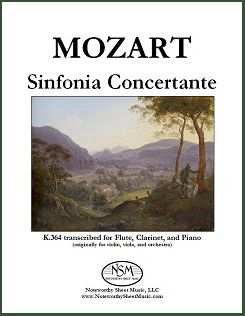 Sinfonia Concertante, K.364, by Wolfgang Amadeus Mozart
Sinfonia Concertante, K.364, by Wolfgang Amadeus Mozart
(originally for Violin, Viola, and Orchestra)
Piano Score, Flute & Clarinet Parts, PDF $17.99
Excerpted from the Foreword by J. W. Pratt: "The idea that every piece, especially a major one, can be satisfactorily transcribed for whatever instruments one would like is one I firmly reject. However, a trio arrangement of this Sinfonia Concertante for flute, clarinet, and piano can, I believe, capture and present in a new light many of the wonders of this great work, even the wonders of its sonorities. .... In the arrangement here, the flute and clarinet almost always play either a solo part or an orchestral part with only octave changes. .... For the piano, on the other hand, straightforward orchestral reduction is often ineffective and unsatisfying, and that would certainly be true here, even with the flute and clarinet taking some wind parts. I have attempted instead to find natural piano "orchestrations" as alternatives to Mozart's orchestral layouts, especially where the full orchestra is playing. .... Such effects, often heightened on returns, are better suited to the piano's capabilities and its role as a member of a trio than a straightforward reduction would be. .... The music available for flute, clarinet, and piano includes surprisingly few major works. The purpose of our arrangement is to add a significant piece to this repertoire and to enable players and listeners to enjoy Mozart's magnificent Sinfonia Concertante in a new way."
Score, 41 pages; Flute part, 18 pages; Clarinet part, 17 pages; Total, 82 pages.
PreviewMozart – Sonata in E minor – Clarinet (and Piano)
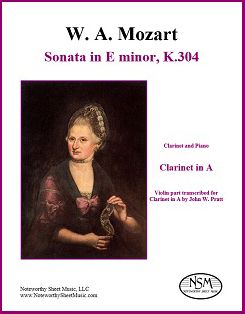 Sonata in E minor, K.304, by W. A. Mozart
Sonata in E minor, K.304, by W. A. Mozart
Transcribed for Clarinet (and Piano) by John W. Pratt
Clarinet in A Part, PDF $5.99
Mozart's second group of violin sonatas, the seven "Mannheim" sonatas of 1778, were begun in Mannheim where the composer also worked on a flute commission. The violin parts rarely make significant use of double stops and are in general well suited to a wind instrument. Mozart's works in minor keys are rare and special: consider the G-minor quintet and Symphony No. 40. The K.304 sonata is his only work in E minor and it is mysteriously compelling in its simplicity. Mr. Pratt has created an excellent transcription of the Sonata in E minor, K.304 for A-clarinet. K.304 was written the same summer that Mozart's mother died, an association often pointed to and the inspiration for our cover image selection.
Note that Mr. Pratt's transcription offers the advantage of being in the original key, and that we provide the A-clarinet part only. The clarinet part works perfectly with the piano part in Mozart's score for piano and violin, which is in the public domain and readily available on imslp.org, free of charge.
For additional information about the seven Mozart Mannheim sonatas and Mr. Pratt's previous transcriptions of them for alto flute, please read his article Mozart's Mannheim Sonatas, which was originally published by Flute Focus and subsequently republished by NSM on our Resources – Reviews and Articles page.
Clarinet part, 5 pages; Total, 8 pages.
Schubert - Auf dem Strom - Vo/Cl/Pf
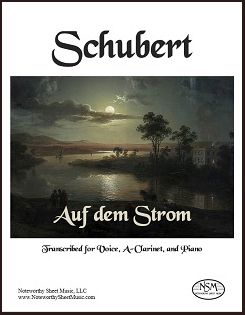 Auf dem Strom, Op.119, by Franz Schubert
Auf dem Strom, Op.119, by Franz Schubert
Obbligato transcribed for A-Clarinet by C. A. Vater
Piano Score and Parts for Voice and A-Clarinet, PDF $9.50
The great Austrian composer Franz Peter Schubert (1797-1828) was a master at creating extremely beautiful, melodic, emotional lieder. His song Auf dem Strom (On the River) provided a musical setting for the text of the eponymous poem written by the German poet and music critic Ludwig Rellstab. The lyrics tell the story of a sad parting, of the yearning and loneliness that sets in as the narrator bids farewell to a loved one on shore, while his river journey carries him away towards the sea. The premier performance of Auf dem Strom took place in Schubert’s 1828 public concert, during which the obbligato part was played by Josef Lewy on horn, the instrument for which the obbligato was written and which undoubtedly can provide an appropriately mournful, sentimental character to the piece. However, an alternate obbligato version for cello was also published. Now, with all respect, we provide an A-clarinet version of the obbligato, in expectation that clarinetists will appreciate this addition to the voice/clarinet/piano repertoire. We believe that a well-played clarinet can aptly contribute a suitably complex, dolorous essence and tone that will adequately do justice to this highly romantic lied by Schubert. Schubert himself created one of his most wonderful and popular works, Der Hirt auf dem Felsen, for clarinet obbligato, and we hope he would welcome our adaptation of Auf dem Strom for A-clarinet.
Score, 19 pages; Voice part, 4 pages; A-Clarinet part, 4 pages; Total, 32 pages.
PreviewSchumann, Clara – Sechs Lieder - trans. for Clarinet (and piano)
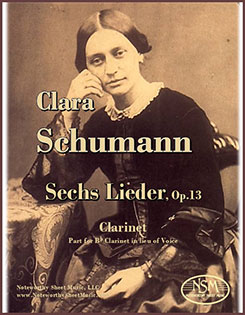 Sechs Lieder, by Clara Schumann
Sechs Lieder, by Clara Schumann
Transcribed for Clarinet by C. A. Vater
Part for B-flat Clarinet (in lieu of voice); PDF $5.99
In her Sechs Lieder, Op. 13, Clara Schumann set to music six German poems—two written by Heinrich Heine (Ich stand in dunklen Träumen and Sie liebten sich beide), three by Emanuel Geibel (Liebeszauber, Der Mond kommt still gegangen, and Die stille Lotosblume) and one by Friedrich Rückert (Ich hab’ in deinem Auge). Many of Clara Schumann’s songs were composed as gifts for her beloved husband Robert; they are romantic, melodic and highly expressive, and the Sechs Lieder of Op. 13 appropriately convey the broad array of intense emotions portrayed in the poetry that inspired them. These songs, which are absolutely charming, are nicely adaptable for a solo instrument in lieu of voice. They have been transcribed previously for violin or cello, and likely other instruments as well, but are particularly lovely when played on either alto flute or clarinet, instruments for which the voice line falls completely in range. Our Noteworthy Sheet Music editions of Op. 13 for alto flute or clarinet do not include re-notated versions of the score, since a high-quality PDF of the original piano and voice score is available free of charge in the public domain, and that piano accompaniment works perfectly well with our instrumental transcriptions of the voice line. The score we used when creating our parts may be downloaded from the IMSLP website. For NSM’s alto flute transcription of the Sechs Lieder voice line, please click the link.
B-flat Clarinet Part, 4 pages; Total, 6 pages.
PreviewScriabin - Romance - Transcribed for Clarinet, Flute, or Alto Flute
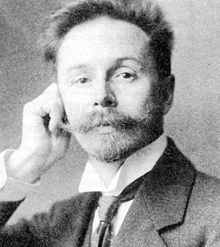 Romance, by Alexander Scriabin
Romance, by Alexander Scriabin
Transcribed for Clarinet or Flute or Alto Flute (and Piano) by J. W. Pratt
Parts, PDF $0.00
Alexander Scriabin (1872-1915), the mystic Russian composer with music to match, wrote nine mind-bending orchestral works and myriad mostly miniature piano pieces. He began as a "Russian Chopin" and ended planning a week-long "Mysterium" to be performed in the Himalayas using "an orchestra, a large mixed choir, an instrument with visual effects, dancers, a procession, incense, and ... mists and lights" (Wikipedia).
The Romance of 1890, his only chamber work except one variation for string quartet, is nearer the Chopin end of that spectrum, though the piano part adds harmonic and rhythmic complexities not evident from the solo part alone. —John W. Pratt, Jan. 19, 2016Please click on the links to download your free PDFs:
Transcription for clarinet required no changes of pitch. Scriabin - Romance - Clarinet
The transcription for flute is raised an octave, except the last five measures. Scriabin - Romance - Flute
The transcription for alto flute raises MM21-24 and MM36-48 an octave. Scriabin - Romance - Alto Flute
The piano score is freely available on IMSLP.org.
Scriabin image courtesy of Wikimedia.org, PD-old.
Valerius/Kremser/Pratt - We Gather Together - arr. WW5
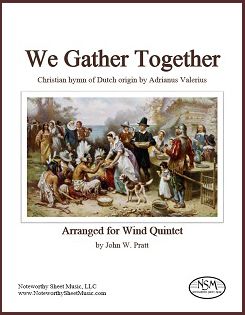 We Gather Together, by Adrianus Valerius
We Gather Together, by Adrianus Valerius
Arranged for Woodwind Quintet by John W. Pratt
Score and Parts for Flute, Oboe, Bb Clarinet, F Horn, and Bassoon; PDF $5.99
Wilt heden nu treden, nowadays more commonly known as We Gather Together, is a Christian hymn of Dutch origin composed by Adrianus Valerius and first published in 1626 (imslp.org); it was later harmonized by Eduard Kremser (en.wikipedia.org). In the United States, We Gather Together is the most popular song traditionally associated with the Thanksgiving holiday. John Pratt has created an arrangement of We Gather Together for woodwind quintet that lends new excitement and interesting harmonies to this old favorite. In his family, the tradition goes back as far as John Pratt (b. 1931) can remember, and when it fell to him to play all three stanzas at his family's annual gathering, he got interested in livening it up. The opportunistic half-step modulations introduced to help amateur voices warm up also brighten successive stanzas for winds. Our Noteworthy Sheet Music edition includes a score in concert pitch, as well as parts for flute, oboe, Bb clarinet, horn in F, and bassoon.
To listen to a computer-generated audio file of the WW5 arrangement, click the link.Of course, the piece will sound much better live on real instruments.
Note that for this publication, the parts should be printed one-sided since they are only one page each and we have not inserted blank filler pages.
Score, 3 pages; Parts for Flute, Oboe, Bb Clarinet, F Horn, and Bassoon, 1 page each; Total, 10 pages.
PreviewVercoe – Duos – 2 Flutes, Oboes, or Clarinets
 Woodwind Duos, by Elizabeth Vercoe
Woodwind Duos, by Elizabeth Vercoe
Original Compositions for 2 Flutes, 2 Oboes, or 2 Clarinets, $0.00 (free!)
Elizabeth Vercoe's Duos for woodwinds are available as free downloads from the composer's own website at http://www.elizabethvercoe.com/. Dr. Vercoe kindly offered to allow Noteworthy Sheet Music, LLC to make these duets available from our website as well.
The Duos, in versions for two flutes, two oboes, or two clarinets, are "fun and quite easy. They are suitable for intermediate students."
Photo of Elizabeth Vercoe courtesy of Caroline Alden.
Just click on the links below to download the Duos at no charge; each PDF includes all 5 short duets:
Duos for 2 FlutesDuos for 2 Oboes
Duos for 2 Clarinets
Walckiers - 2nd Book of Duets - Flute + Clarinet
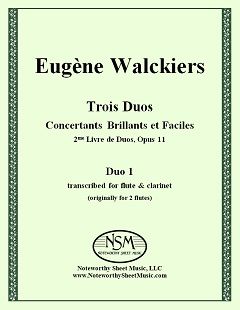 Trois Duos Concertants Brillants et Faciles, by Eugène Walckiers
Trois Duos Concertants Brillants et Faciles, by Eugène Walckiers
2me Livre de Duos, Op.11
Transcribed for Flute and B-flat Clarinet by C.A.Vater
Duo 1: Flute Part, Clarinet Part, and Score, PDF $10.50
Duo 2: Flute Part, Clarinet Part, and Score, PDF $15.00
Duo 3: Flute Part, Clarinet Part, and Score, PDF $16.50
Please view our listing for Eugène Walckiers' 2me Livre de Duos pour Deux Flutes to read a general description of this work. After publishing our renotated modern editions of these wonderful Walckiers' flute/flute duets, Noteworthy Sheet Music received a request that we create transcriptions of the duets for flute and B-flat clarinet. We thought this was a great idea, and our flute and clarinet versions are now available.
=============================================================
For those who would prefer to purchase professionally-printed hard copies, our print editions of the 2nd Book of Duos, Op.11 by Eugène Walckiers, transcribed for Flute and Clarinet are available directly from NSM. Duo 1, $17.85; Duo 2, $25.50; Duo 3, $28.05; plus a $5.95 shipping and handling fee to addresses in the USA. Please use the Contact Us form to let us know which hard copy publication(s) you would like to purchase, along with your email contact information and USPS mailing address. We will then send you a PayPal invoice for the sale and, once we receive notice from PayPal that you have paid for the item(s), we will ship your music to the address provided.
